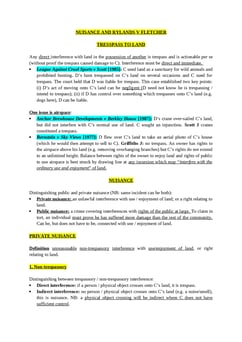Morgan v Odhams Press [1971] 2 All ER 1156
Judgement for the case Morgan v Odhams Press
The claimant bought an action against the defendant newspaper in defamation. The newspaper article claimed that a young woman had been kidnapped by a dog-doping gang. At about the time of the kidnapping, she had been staying at the claimant's house.
The claimant alleged that there was an innuendo - that people who knew the circumstances would be led to the conclusion the he was part of the gang himself.
By a majority, the House Of Lords held that there was sufficient evidence for the matter to go to a civil jury. There did not need to be a particular `peg or pointer' to a specific individual in a defamatory article, so long as its general tenor would reasonable lead to the individual being identified.
-
HL held that that in determining the impression that would be left on the mind of the reader regard should be had to the character of the article and the class of reader likely to read it;
That the relevant impression to be taken into consideration was that which would be conveyed to an ordinary sensible man (having knowledge of the relevant circumstances) reading the article casually and not expecting a high degree of accuracy;
that in order to be defamatory of the plaintiff the article complained of had to contain something which, to the mind of a reader with knowledge of the relevant circumstances, contained defamatory imputations and pointed to the plaintiff as the person defamed.
Lord Reid
We ought to be realistic in determining what inferences will be drawn by an ordinary sensible reader, NOT what would be inferred by a cautious lawyer. Logic is not the issue.
In being realistic, we ought consider the class of reader
Lord Donovan (dissenting on the “class of reader” point)
If we say that the nature of the readers is to be considered in assessing whether there is defamation, we would end up with two classes of “reasonableness” for inference and two classes of “ordinary, sensible reader,” i.e. an ordinary reader of the sun is different from an ordinary reader of The Times.
-
This would mean that an article published in a quality newspaper is not defamatory whereas one in the a tabloid is not
(This is relevant here as, if the readers had read the full article they would have known that Plaintiff wasn’t part of the gang, but if they only look at the headlines/pictures they would think he was).
Lord Pearson
The question for the judge in a case such as this is not something separate and independent from the question for the jury, but is whether there is evidence on which a reasonable jury, properly directed and acting properly, could give an answer in favour of the plaintiff.
For Further Study on Morgan v Odhams Press
Need instant answers? Our AI exam tutor is here to help.
Ask questions 🙋 Get answers 📔 It's simple 👁️👄👁️
Our AI is educated by the highest scoring students across all subjects and schools. Join hundreds of your peers today.
Get StartedSimilar Cases
Related Product Samples
These product samples contain the same concepts we cover in this case.

 Since 2010, Oxbridge Notes has been a trusted education marketplace, supplying high-quality materials from top achievers at universities like Oxford, Cambridge, LSE, Harvard, and Yale.
Since 2010, Oxbridge Notes has been a trusted education marketplace, supplying high-quality materials from top achievers at universities like Oxford, Cambridge, LSE, Harvard, and Yale.